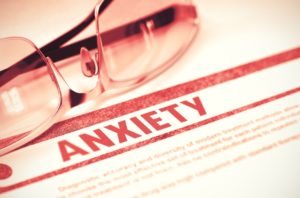
Have you noticed that you forget things in times of particular stress? This is both common and normal. Cascading thoughts that tumble unchecked make it hard to focus as our attention gets shifted from one worrisome task to another. The rabbit-hole pull of worry makes letting go of such thoughts difficult. Most people recover their equilibrium once the crisis is over, and their normal memory returns. But for people with chronic anxiety, who worry even when all is well, a disabling loss of memory can occur.
In fact, one key symptom of generalized anxiety disorder (GAD) is uncontrollable worry in which sufferers imagine many possible terrible outcomes. This self-talk, as it’s called, can escalate to catastrophizing—magnifying a small concern into a full-blown panic attack.
But attention can be trained, even for people with GAD. Attentional control is the ability to stay focused on a task even when competing thoughts intrude. As psychologist William James wrote in 1890, “the faculty of voluntarily bringing back a wandering attention, over and over again, is the very root of judgment, character, and will.” But, as James also noted, it’s “easier to define this ideal than to give practical directions for bringing it about.” That’s especially true for people with GAD, whose attention is preoccupied with worrisome thoughts, making it particularly challenging to shift their focus to more helpful thoughts or tasks. And this challenge can easily affect self-esteem; along with James, many consider attentional control as a hallmark of intelligence and willpower.
Memory comes in two basic types: short term and long term. In this discussion, we’re focusing on working or short-term memory, which is like a small scratchpad holding a limited amount of information. The magic number of items working memory can retain is seven, plus or minus two. It could be numbers, names, or locations—any bit of discrete information—so long as they’re simple or familiar. Most people top out at seven bits of information; some remember nine, or maybe only five.
Stress and Anxiety’s Effect on Working Memory
Worry consumes a lot of our limited mental space. Stress is analogous to the CPU of your computer, the processing engine. When we’re stressed or preoccupied, some portion of our mental processing power is being drained away even if we’re not conscious of thinking about the stressful subject. That leaves us fewer mental resources for thinking about the thing right before us that does deserve our attention.
Worry distracts us from paying attention to anything but our worry. Let’s say I’m at the dentist, getting my tooth drilled. I want to distract myself from the whining sound, the burning smell, and the gloved hands in my mouth, so I’m listening to a podcast. How would my stress about the unpleasantness affect my absorption of podcast’s information? My hope is that it’ll help me ignore the pain signals, but the reverse could also be true: The pain, or just the fear of pain, can interfere with absorbing the podcast. If I entertain thoughts like “Oh no, what if he accidentally drills into my gum by mistake,” my autonomic nervous system goes into high alert, triggering my threat system and limiting my focus.
So, whether or not you suffer from GAD, everyone can relate to feeling mentally burdened by too many things on our mind at once. Perhaps we can manage for a while, but pretty soon we start to feel stressed and unable to process. If we can increase our capacity, we’d be increasing our thinking capacity. We do this by learning to focus attention.
Can we improve working memory? Mindfulness meditation is one way. In this practice, we focus attention on our breathing (or other activities) and settle the mind. Each time we notice our minds wandering to a worry, we return our attention to our breath without condemning ourselves. Research has shown that we can increase our attentional ability, and the biggest changes come the more we practice. This practice includes both formal sitting meditations and informal actions performed mindfully, like walking, doing the dishes, or eating. Retraining our attention this way improves memory and lessens worry’s grip.


Leave a Reply